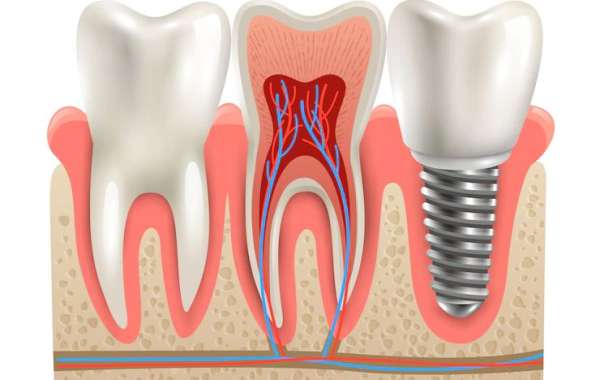Introduction
Dental implants have revolutionized the field of dentistry, offering a reliable and permanent solution for missing teeth. With advances in technology, dental implants have become increasingly popular, providing numerous benefits over traditional dentures and bridges. This guide aims to provide an in-depth look at dental implants, covering their benefits, the procedure, and essential aftercare tips to ensure long-term success.
What Are Dental Implants?
Dental implants are artificial tooth roots made of titanium that provide a permanent base for fixed, replacement teeth. Unlike other tooth replacement options, dental implants are surgically placed into the jawbone, where they fuse with the bone through a process called osseointegration. This creates a strong and durable foundation for the replacement teeth.
There are different types of dental implants, including endosteal implants, which are placed directly into the jawbone, and subperiosteal implants, which are placed under the gum but above the jawbone. The choice of implant depends on the patient's bone structure and specific needs.
A dental implant typically consists of three components: the implant itself, the abutment, and the crown. The implant is the titanium post that is inserted into the jawbone. The abutment is a connector that is placed on top of the implant to hold the crown. The crown is the visible part of the tooth that is custom-made to match the natural teeth in shape and color.
Benefits of Dental Implants
Improved Oral Health
One of the most significant benefits of dental implants is the improvement in oral health. When a tooth is lost, the jawbone in that area begins to deteriorate because it no longer receives stimulation from the tooth root. Dental implants prevent bone loss by stimulating the jawbone, maintaining its strength and structure. Additionally, unlike traditional bridges, dental implants do not require the alteration of adjacent healthy teeth, preserving the natural tooth structure.
Enhanced Aesthetics
Dental implants look and feel like natural teeth. They are custom-made to match the color, shape, and size of the surrounding teeth, providing a seamless and natural appearance. This improvement in aesthetics can boost self-esteem and confidence, as patients no longer have to worry about gaps in their smile or ill-fitting dentures.
Functionality and Comfort
Dental implants function like natural teeth, allowing patients to chew, speak, and smile with confidence. They provide stability and support that cannot be matched by other tooth replacement options. The permanent nature of dental implants also eliminates the discomfort and inconvenience associated with removable dentures.
Convenience
Dental implants offer a convenient solution for tooth replacement. Unlike dentures, which require special cleaning and maintenance, dental implants can be cared for with regular brushing and flossing. This makes maintaining oral hygiene easier and more effective. Furthermore, dental implants do not need to be removed, eliminating the hassle and potential embarrassment of dealing with removable dentures.
The Dental Implant Procedure
Initial Consultation and Planning
The dental implant process begins with a thorough consultation and examination by a dental professional. During this initial visit, the dentist will assess the patient's oral health, review their medical history, and take detailed images of the jawbone to determine the best treatment plan. This consultation is crucial for identifying any potential issues and ensuring the patient is a suitable candidate for dental implants.
Pre-Procedure Preparations
In some cases, patients may require pre-procedure treatments to prepare the jawbone for implant placement. This can include bone grafting, which involves adding bone material to the jaw to provide a solid foundation for the implant. Bone grafting is typically needed if the patient has experienced significant bone loss. Patients will also receive instructions on how to prepare for the procedure, including guidelines on eating, drinking, and medications.
Surgical Procedure
The surgical placement of dental implants is a multi-step process. First, the dentist will administer anesthesia to ensure the patient is comfortable and pain-free during the procedure. Next, a small incision is made in the gum to expose the jawbone, and a hole is drilled to place the implant. The implant is then inserted into the bone, and the gum is stitched closed.
Healing and Osseointegration
After the implant is placed, a healing period of several months is required for osseointegration to occur. During this time, the implant will fuse with the jawbone, creating a stable and durable foundation for the replacement tooth. Temporary restorations may be placed during the healing period to maintain aesthetics and functionality.
Placement of Abutment and Crown
Once osseointegration is complete, a second minor surgery is performed to attach the abutment to the implant. The abutment serves as a connector between the implant and the crown. After the gums have healed around the abutment, a custom-made crown is placed on top, completing the dental implant process. The crown is designed to blend seamlessly with the surrounding teeth, providing a natural and functional replacement.
Aftercare and Maintenance
Immediate Post-Procedure Care
Proper aftercare is crucial for the success of dental implants. Immediately following the procedure, patients may experience some discomfort, swelling, and minor bleeding. Pain can be managed with over-the-counter pain relievers, and cold compresses can help reduce swelling. It is important to follow the dentist’s instructions regarding diet, which typically includes eating soft foods and avoiding hot beverages for a few days.
Long-Term Care
Long-term care for dental implants involves maintaining good oral hygiene and regular dental check-ups. Brushing twice a day, flossing daily, and using an antibacterial mouthwash can help keep the implant and surrounding tissues healthy. Regular dental visits are essential for monitoring the condition of the implants and ensuring any potential issues are addressed promptly.
Potential Complications and Solutions
While dental implants have a high success rate, complications can occur. Common issues include infection at the implant site, implant failure, and damage to surrounding structures. These complications can often be prevented with proper care and early intervention. If complications arise, it is important to contact the dentist immediately to address the issue and prevent further problems.
Choosing Professional Dental Implants Over Natural Remedies
While natural remedies and alternative treatments may offer temporary relief for dental issues, they cannot provide the permanent and effective solution that professional dental implants offer. Professional dental implants are backed by extensive research, advanced technology, and clinical expertise, ensuring a high success rate and long-term benefits.
Natural remedies cannot replace lost teeth or restore the function and aesthetics of a smile effectively. Choosing a professional dental implant provider, such as Dental Implants Hale, ensures that patients receive comprehensive care, from initial consultation to post-procedure follow-up. This professional approach minimizes risks and maximizes the success and longevity of the implants.
Conclusion
Dental implants offer a reliable and permanent solution for missing teeth, providing numerous benefits over traditional dentures and bridges. With improved oral health, enhanced aesthetics, and superior functionality, dental implants can significantly improve the quality of life for those with missing teeth. By understanding the benefits, procedure, and aftercare involved in dental implants, patients can make informed decisions about their dental health. Choosing a professional provider, such as Dental Implants Hale, ensures the highest level of care and the best possible outcomes for dental implant treatment.







